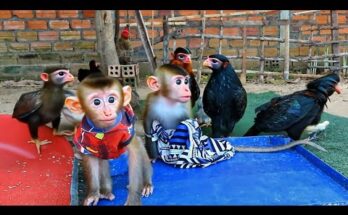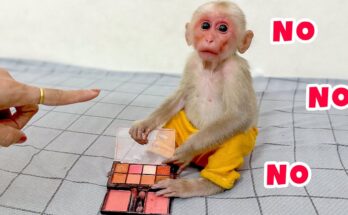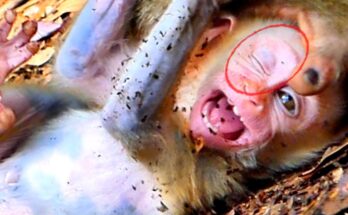
Milo. His fur, once soft and golden, was now matted with mud and blood. His tiny arm looked twisted, and there were deep scratches on his back and leg. It was clear something terrible had happened. No one knew if it was a fall from a tree or an attack by a predator, but the injuries were serious—and the little one was helpless.
Thankfully, fate was kind that morning.
A local man named Dara, known for caring for animals in the area, was walking by on his way to collect fruit. Hearing the faint whimpers, he stopped, looked around, and saw the injured monkey barely moving in the grass. His heart broke at the sight. He gently picked Milo up, careful not to hurt him more. The monkey didn’t resist—he was too weak. His tiny hand tried to grip Dara’s shirt, and his eyes, filled with pain, pleaded for help.
Dara rushed home, calling out to his wife to prepare warm water and a soft towel. They cleaned Milo’s wounds carefully, trying not to cause more distress. A vet who often helped wild animals was contacted and arrived an hour later. After examining him, the vet gave Milo medicine to ease the pain and reduce the swelling. The diagnosis wasn’t easy—his leg was fractured, and the deep cuts risked infection. But with care and patience, there was hope for recovery.
In the days that followed, Milo was placed in a small, clean basket lined with cloth. Dara fed him mashed bananas and soft fruit with a spoon. At first, the baby monkey hardly moved. He mostly slept, only waking to eat a little or cry softly in pain. But as the medicine started to work, and the love around him grew stronger, so did his spirit.
By the second week, Milo was sitting up. His leg was still in a light bandage, but he had started using his good arm to pull himself around. He even reached for Dara’s finger and held it gently—a sign of trust. Every little movement, every improvement, was a victory. His eyes sparkled again, and the fear began to fade.
The villagers began to visit. Children brought ripe fruit, while others donated cloth, milk, or even little toys. Everyone felt a connection to Milo. He wasn’t just a monkey—he had become a symbol of kindness and second chances.
One afternoon, nearly a month after the incident, Milo took his first small steps in the backyard. He was clumsy, but determined. He climbed halfway up a tree stump, paused, and looked around as if to say, “I’m not done yet.”
Tears welled in Dara’s eyes as he watched. The little monkey who was once close to death had fought his way back to life—because someone cared.
Milo’s story spread through the nearby villages. People started being more careful with the animals around them. Some even set up signs to slow down motorbikes near the forest path where Milo had been found. Others began placing food and water out during the dry season to help wildlife.
Milo became more than just a rescue. He was a reminder that even the smallest life deserves love, and that no act of kindness is ever wasted.


